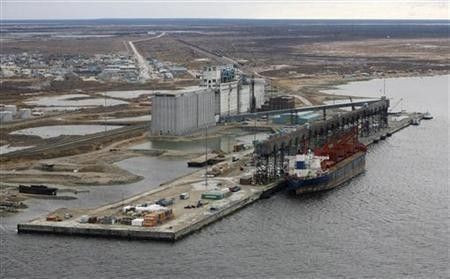Canada's tiny Arctic port faces uncertain future

WINNIPEG, Manitoba (Reuters) - Every summer for three months, the Hudson Bay ice breaks up and ships load Canadian Prairie grain for export, putting more than 100 people to work in the tiny northern Manitoba town of Churchill.
The town of just 900 - well known for the polar bears that often wander through its streets - is Canada's only Arctic port. But that key driver of the local economy could become as endangered as the polar bear next year when the Canadian Wheat Board, the port's biggest shipper, loses its monopoly on marketing Western Canadian wheat and barley.
The Wheat Board will become a smaller grain-pooling option for farmers starting next August, according to legislation being put through Parliament by the Conservative government, and that could threaten Churchill's long-standing share of grain shipments.
The CWB has previously favored the northern port for its cost savings, thanks to its proximity to Prairie farmers and access to some European markets.
But big grain handlers like Viterra, Richardson International Ltd and Cargill may be more likely to use port terminals they own on the Great Lakes and or on the West Coast to ship grain overseas.
(The port) brings a lot of out-of-towners here and local businesses get a boost off of it, said Michlynn Gulick, a local manager for trucking firm Gardewine North, adding she's optimistic the port will remain busy.
It's been here forever.
Manitoba's agriculture minister, Stan Struthers, has said the end of the CWB's marketing monopoly will hit Churchill hard, referring to it according to one report as the slow death of the port, which dates back to the 1930s.
Mike Spence, the mayor of the town that bills itself as the Polar Bear Capital of the World, said there's no need to fear the worst in the changes facing both the Wheat Board and Churchill.
There's a lot of people assuming that's the end of shipping at Churchill. I don't believe that, he said in an interview.
Without those jobs, naturally you'll have a decrease in population, but the fact is, we're not going there. We're looking for opportunities.
Port of Churchill owner OmniTrax, a Colorado-based railway company that also owns the rail line leading to the port, plans to build Churchill's viability for the long term, said Brad Chase, president of the company's Canadian division.
We're looking out 10 years from now and making sure the port has what it needs to ensure the jobs and the businesses (are) in real good stead, he said in an interview.
OmniTrax sees an opportunity to ship fuel to Canada's northern territory of Nunavut for its growing mining sector, Chase said. It also aims to supply the North with general cargo.
Climate change could also buoy Churchill's fortunes, if melting Arctic ice extends the port's shipping season and opens new routes through the Arctic Ocean to Asia, Chase said.
We need a combination of volume (from different sources) to make it all work, he said.
The Wheat Board exported 507,000 metric tons of wheat and durum through Churchill in 2011 to Europe, Africa and Latin America, making up about 90 percent of the port's freight.
That volume works out, by comparison, to less than 4 percent of the year-to-date grain volume through September at Port Metro Vancouver, the country's biggest export hub.
Churchill has also handled non-CWB freight such as peas, canola and fertilizer, although not in steady volumes.
The Canadian government has committed C$5 million ($4.9 million) annually for up to five years in incentives for shipping through Churchill, but it has not said how they will work.
Those details are critical to knowing if it will be worthwhile to use the port, said a grain industry source.
Most companies will have an established logistical chain and supply route, so to disrupt that for three months of the year does become problematic.
Churchill is cheaper than other ports for shipping grain to northern Europe, but that's a limited market, the source said.
Chase of OmniTrax declined to comment on the possibility of sharing the port's ownership with a grain handler to attract more volume.
We need the right relationships, no question, and there are a number of grain companies we can work with to make sure there's enough volume, he said.
($1=$1.02 Canadian)
(Editing by Rob Wilson)
© Copyright Thomson Reuters 2024. All rights reserved.





















